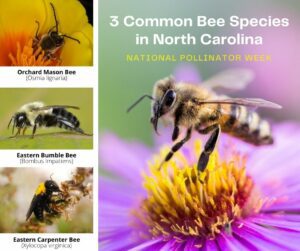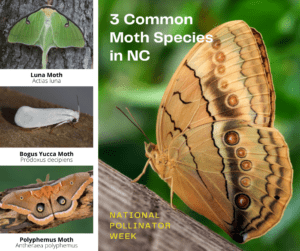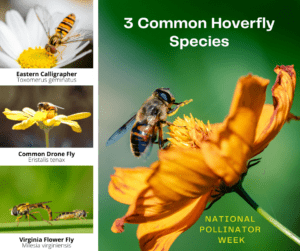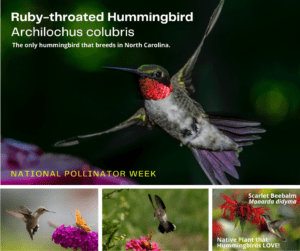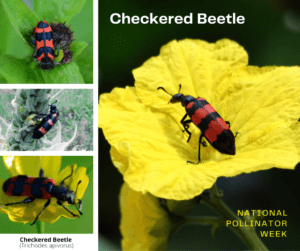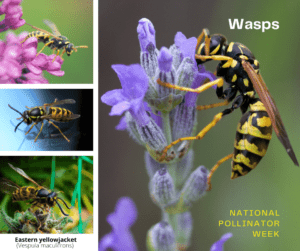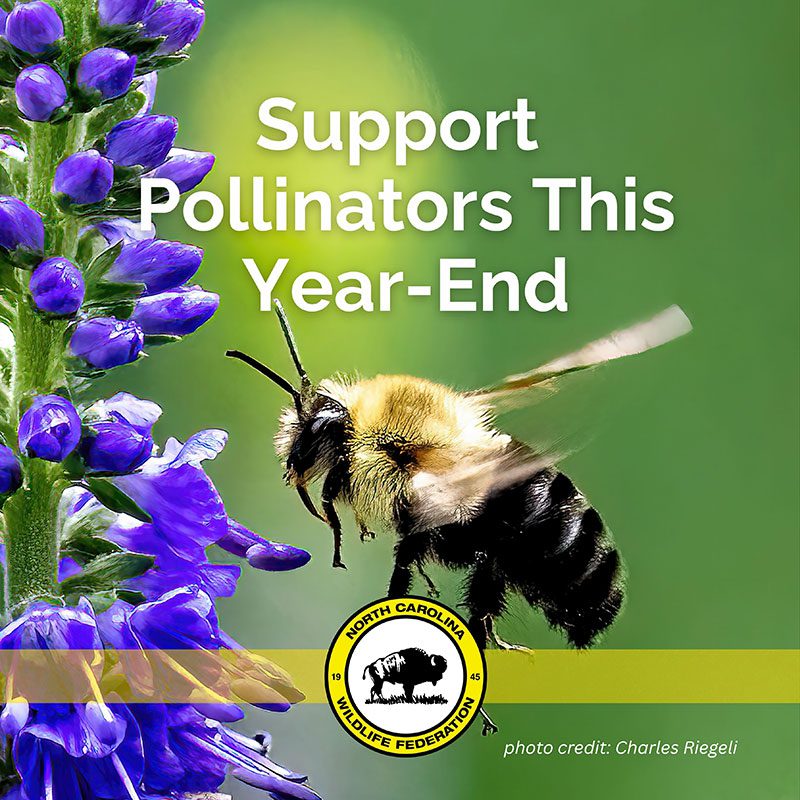Learn About the Birds and the Bees (and Other Pollinators!)
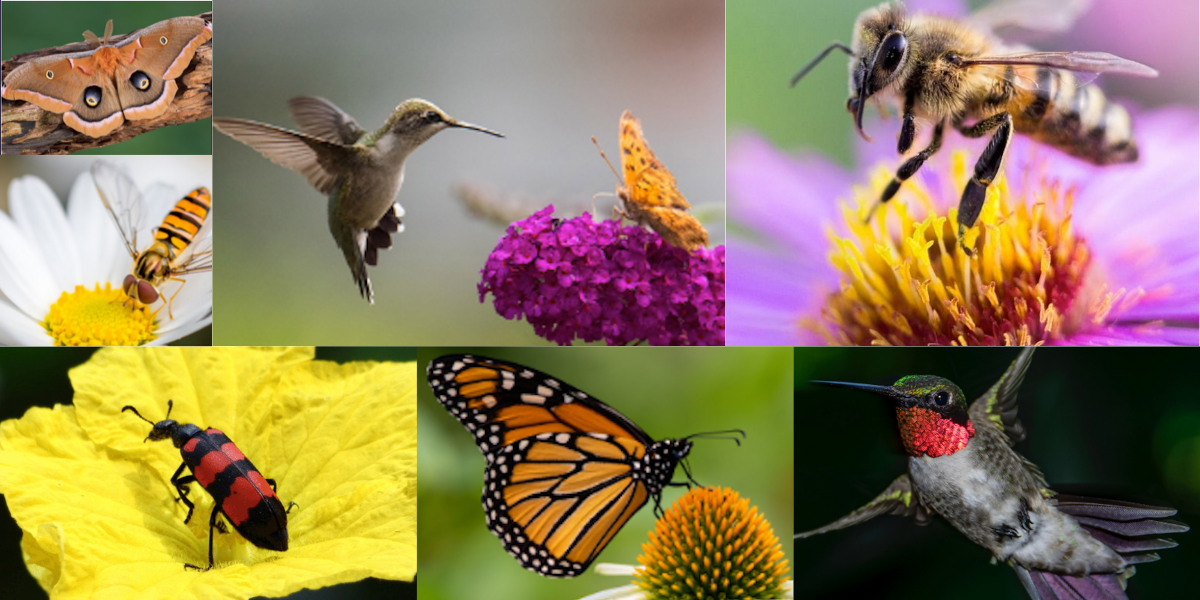
It’s National Pollinator Week (June 20-26), and North Carolina Wildlife Federation is continuing our celebration of pollinators – including butterflies, bees, moths, flies, beetles, wasps and hummingbirds – and their essential role in the health of our ecosystems.
Pollinators need the same things humans need to survive: food, water, cover and places to raise young; however, there’s a growing concern for pollinators over the loss of viable habitat and fewer available host plants due to urban sprawl, climate change and pesticide use. N.C. Wildlife Federation is committed to helping preserve these disappearing species through pollinator gardens, gardening for wildlife and other habitat conservation programs and events.
Identifying pollinators in our backyards and communities strengthen human-wildlife connections and helps spread awareness for habitat conservation. And with the official start of summer on Tuesday, it means butterflies, hummingbirds, moths and other species will be busy as bees as they eati nectar, collect pollen and help plants reproduce. Here are some of North Carolina’s most common pollinator species, the native plants they love and how you can help.
Butterflies
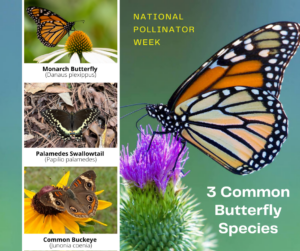 N.C. residents: Monarch butterfly (Danaus plexippus), Palamedes swallowtail (Papilio palamedes) and common buckeye (Junonia coenia)
N.C. residents: Monarch butterfly (Danaus plexippus), Palamedes swallowtail (Papilio palamedes) and common buckeye (Junonia coenia)
Native plant they love: Common milkweed (Asclepias syriaca)
Fun facts: Adult butterflies may feed on nectar from flowers, but some prefer rotten fruit or tree sap. They suck the liquid food through a straw-like “tongue” called a proboscis. Butterflies bask in the sun to warm their bodies before they fly. Their wings act as solar collectors.
Learn more: The Butterfly Highway
Bees
N.C. residents: Orchard mason bee (Osmia lignaria), eastern bumble bee (Bombus impatiens) and eastern carpenter bee (Xylocopa virginica)
Native plant they love: Whorled tickseed (Coreopsis verticillata)
Fun facts: There are over 500 native bees found in North Carolina. Honeybees commonly perform a ‘waggle dance’ as a clever way to communicate with their nestmates.
Learn more: Get to Know the Wild Bees in Your Yard (webinar)
Moths
N.C. residents: Luna moth (Actias luna), bogus yucca moth (Prodoxus decipiens) and polyphemus moth (Antheraea polyphemus)
Native plant they love: Seaside goldenrod (Solidago sempervirens)
Fun fact: Moths are also considered critical nocturnal pollinators. They use the moon or bright stars to help with their sense of direction; artificial lights disrupt and mislead them.
Learn more: Marvelous Moths of North Carolina (webinar)
Hoverflies
N.C. residents: Eastern calligrapher (Toxomerus geminatus), common drone fly (Eristalis tenax) and Virginia flower fly (Milesia virginiensis)
Native plant they love: Elderberry (Sambucus canadensis)
Fun facts: Hoverflies are essential pollinators and serve as pest control agents. Many species of hoverflies predate on aphids as larvae. Hoverflies are an excellent example of Batesian mimicry – predators typically avoid them because they resemble bees and wasps.
Learn more: Insects in the Environment (webinar)
Hummingbirds
N.C. resident: Ruby-throated hummingbird (Archilochus colubris)
Native plant they love: Scarlet beebalm (Monarda didyma)
Fun facts: Hummingbirds can fly over 30 mph, are more maneuverable than a helicopter, and only weigh about a penny. The ruby-throated hummingbird is the only hummingbird that breeds in North Carolina.
Learn more: Hummingbirds in North Carolina (webinar)
Beetles
N.C. resident: Checkered beetle (Trichodes apivorus).
Native plant they love: Venus flytrap (Dionaea muscipula)
Fun fact: Beetles account for roughly a quarter of all Earth’s species.
Learn more: Insects in the Environment (webinar)
Wasps
N.C. resident: Eastern yellowjacket (Vespula maculifrons)
Native plant they love: Calico aster (Symphyotrichum lateriflorum)
Fun facts: Yellowjackets are attracted to sugar sources such as ripe fruit, nectar and drink cans. Many wasp species are important pollinators and also contribute to food security since some species predate on crop pests.
Learn more: Insects in the Environment (webinar)
5 ways to help North Carolina’s pollinators
- Purchase a packet of our native pollinator seed mix, which provides several native flowering plants, including milkweed, black-eyed Susan and coneflower.
- Order a Butterfly Highway sign to show your commitment to protecting pollinators and providing a haven for butterflies, bees and more.
- Register your yard as a Pollinator Pitstop and commit to providing a safe place for pollinators to thrive in both adult and early stages.
- Support the Butterfly Highway with a tax-deductible gift to help expand pollinator habitat throughout North Carolina through on-the-ground restoration projects.
- Sign up for The Butterfly Highway newsletter for the buzz on pollinators and native plants for your yard, where to buy them, and what’s flying and blooming in North Carolina.


